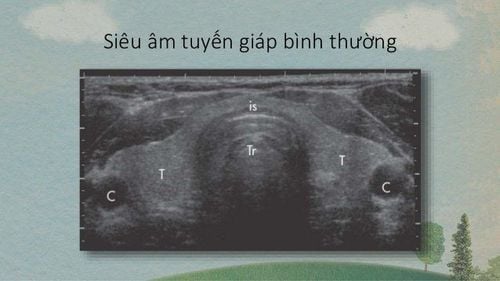This is an automatically translated article.
The article was professionally consulted by Specialist Doctor I Tran Cong Trinh - Radiologist - Radiology Department - Vinmec Central Park International General Hospital.The thyroid gland is an organ with many diseases, especially for women, and seriously affects health, so regular screening and examination including the thyroid area is essential. Thyroid ultrasound is one of the most common ways to monitor health.
1. What is the thyroid gland?
Before learning what is thyroid ultrasound? And what is the purpose of thyroid ultrasound? then let's go through a bit of the concept of the thyroid gland. The thyroid gland is the body's largest endocrine gland, which controls metabolism. It is a gland that secretes thyroid hormones including thyroxine, tri-iodo-thyronine hormone. The thyroid gland is located in front of the neck, shaped like a butterfly, in front of the thyroid is the skin and muscle, behind the thyroid is the windpipe. The thyroid gland consists of two lobes, the left and right lobes, which are connected by the isthmus of the thyroid gland. The thyroid gland is one of nine endocrine glands located throughout the body that produce and release hormones into the bloodstream.

Vị trí tuyến giáp
2. What is a thyroid ultrasound?
Thyroid ultrasound is an imaging technique using sound waves, where doctors use the transducer of an ultrasound machine placed in the neck area, then the ultrasound machine will provide detailed images of the thyroid gland. characteristics and properties of the thyroid gland and adjacent structures in the neck.
Benefits of thyroid ultrasound: It is a non-invasive, painless technique. Easy to use and less expensive than other methods. Ultrasound produces clear, realistic images of soft tissue, safe, without ionizing radiation. Ultrasound is also a good tool to guide minimally invasive procedures such as needle biopsies and fluid aspiration.
3. Thyroid ultrasound for what?
The following are very important purposes of a thyroid ultrasound:
You may have a thyroid ultrasound if your thyroid function test is abnormal or if your doctor finds an abnormal growth in your thyroid when examining your neck. Ultrasound may also be used to check for hypothyroidism or hyperthyroidism.
Thyroid ultrasound technique as part of routine physical examination. Ultrasound can provide high-resolution images of other organs, helping your doctor better understand your health. Your doctor may also order an ultrasound if he or she notices unusual swelling, pain, or infection so that potential causes of these symptoms can be detected.
Thyroid ultrasound may also be used if the doctor needs to perform a fine needle aspiration (FNA) of the thyroid gland or surrounding tissues for examination.

Siêu âm tuyến giáp giúp chẩn đoán bệnh lý tuyến giáp
4. How is a thyroid ultrasound performed?
Thyroid ultrasound is usually done in about 20-30 minutes.During thyroid ultrasound the patient lies on an examination table and may be asked to lie on his or her side or face down for a clear ultrasound image. Then, the doctor will apply a clear gel to the neck area to be scanned and the transducer device. The gel will help the transducer make safe contact with the body and remove gases between the transducer and the skin that can block the sound waves. The probe is placed on the neck area and moved back and forth in the area to be examined.
Thyroid ultrasound will provide all the actual images in real time and the image changes continuously as the transducer moves. The image will be recorded on the screen of the ultrasound machine so that the doctor can observe the characteristics of the thyroid area and make the most accurate diagnosis.
5. After thyroid ultrasound
Depending on the ultrasound results, you will need to be monitored after the ultrasound or not. Your doctor may order a biopsy if a tumor is suspected.
You do not need special care if the ultrasound results are not abnormal. If your doctor is performing a thyroid ultrasound as part of your regular physical exam, you'll need to be prepared to have an ultrasound at your next routine checkup. If you have a family history of thyroid abnormalities or related conditions, your doctor will likely order more frequent thyroid ultrasounds to detect thyroid abnormalities early.
If your ultrasound shows something abnormal, your doctor will ask you to conduct more tests to make a more accurate diagnosis. In this case, you may need another ultrasound or another type of ultrasound that can show the thyroid gland more clearly. If you have cysts, thyroid nodules, or tumors, your doctor may recommend surgical removal or other treatments.
Conclusion Thyroid ultrasound is a quick, painless procedure and can help detect many health problems at an early stage. We should check and monitor periodically to detect medical conditions in order to promptly overcome and ensure the health of ourselves and our families.
Vinmec International General Hospital is equipped with modern and advanced equipment and a team of leading experts with high expertise. The hospital now has an effective screening package for thyroid diseases, helping to check thyroid function, screening & early detection of common thyroid diseases such as simple goiter, hyperthyroidism, hypothyroidism, thyroiditis, thyroid nodules, thyroid cancer, ... so that appropriate and timely treatment measures can be taken.
Customers can directly go to Vinmec International General Hospital nationwide for examination or contact the hotline HERE for support.
MORE:
Signs that you need a thyroid ultrasound Common symptoms warning thyroid disease Causes and signs of thyroid cancer













